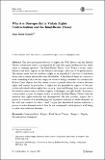Why it is disrespectful to violate rights : contractualism and the Kind-Desire Theory
Abstract
The most prominent theories of rights, the Will Theory and the Interest Theory, notoriously fail to accommodate all and only rights-attributions that make sense to ordinary speakers. The Kind-Desire Theory, Leif Wenar’s recent contribution to the field, appears to fare better in this respect than any of its predecessors. The theory states that we attribute a right to an individual if she has a kind-based desire that a certain enforceable duty be fulfilled. A kind-based desire is a reason to want something which one has simply in virtue of being a member of a certain kind. Rowan Cruft objects that this theory creates a puzzle about the relation between rights and respect. In particular, if rights are not grounded in aspects of the particular individuals whose rights they are (e.g., their well-being), how can we sustain the intuitive notion that to violate a right is to disrespect the right-holder? I present a contractualist account of respect which reconciles the Kind-Desire Theory with the intuition that rights-violations are disrespectful. On this account, respect for a person is a matter of acknowledging her legitimate authority to make demands on the will and conduct of others. And I argue that kind-based desires authorize a person to make demands even if they do not correspond to that person’s well-being or other non-relational features.
Citation
Schaab , J D 2018 , ' Why it is disrespectful to violate rights : contractualism and the Kind-Desire Theory ' , Philosophical Studies , vol. 175 , no. 1 , pp. 97-116 . https://doi.org/10.1007/s11098-017-0857-x
Publication
Philosophical Studies
Status
Peer reviewed
ISSN
0031-8116Type
Journal article
Description
This work was developed with the financial support of the German Academic Exchange Service and the St Andrews/Stirling Philosophy Graduate Programme.Collections
Items in the St Andrews Research Repository are protected by copyright, with all rights reserved, unless otherwise indicated.

